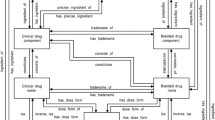Abstract
Medical Dictionary for Regulatory Activities (MedDRA), as the ICH approved standard terminology for all drug regulatory activities, is in many aspects different from previously used terminologies, mainly in size, specificity, structure, rules and conventions. All these aspects impact on retrieval strategies, analysis and presentation of the coded data.
After shortly describing the key features of MedDRA and their theoretically anticipated impact on data analysis and presentation, two examples for display of MedDRA coded data are described, one from a clinical study project and one from spontaneous reporting. The first example compares the adverse drug reaction (ADR) profile of the same data coded in WHO Adverse Reaction Terminology (WHO-ART) and recorded in MedDRA; the second example demonstrates different ways of presenting the ADR profile of an antibacterial, using different elements in MedDRA with the aim of presenting the ADR profile in a way that best transports the medical concepts reported with this drug.
Based on some results obtained from these examples and based on analysis of the content of MedDRA version 6.0, the following limitations of MedDRA for data analysis have been identified: (i) the Preferred Term level is generally too granular, bearing the danger of underestimating risks, and the midlevels are currently not a robust, consistent and non-ambiguous level for data aggregation; and (ii) the rules relating to multiaxiality add complexity for data aggregation because related medical concepts may be split into different System Organ Classes, which may mislead frequency analysis.
In the absence of guidance from regulatory agencies and with the growing need for analysis of MedDRAencoded data, there is a risk of diminishing the benefits of MedDRA as a standard terminology through the use of user-specific and non-standardised data analysis and presentation strategies.
MedDRA would benefit from a redesign of the group terms (High Level Group Terms/High Level Terms) to become a robust, consistent and non-ambiguous level for data analysis and aggregation. This should be done in an interdisciplinary effort coordinated by the MedDRA Maintenance Supply and Support Organisation (MSSO).









Similar content being viewed by others
Notes
2 Use of tradenames is for product identification purposes only and does not imply endorsement.
References
MedDRA term selection, points to consider: ICH-endorsed guide for MedDRA users [online]. Available from URL: http://www.meddramsso.com/newweb2003/document_library/index.htm#Points [Accessed 2004 Nov 13]
MedDRA MSSO standardized MedDRA queries (SMQs) [online]. Available from URL: http://www.meddramsso.com/NewWeb2003/SMQ/index.htm [Accessed 2004 Nov 13]
ICH M4E: common technical document — efficacy [online]. Available from URL: http://www.fda.gov/cder/guidance/4539E.pdf [Accessed 2004 Nov 13]
Kübler J, Vonk R, Beimel S, et al. Adverse event analysis and MedDRA: business as usual or challenge? Drug Inf J. In press
Brown EG. Effects of coding dictionary on signal generation: a consideration of use of MedDRA compared with WHO-ART. Drug Saf 2002; 25 (6): 445–52
Kubota K. Prescription event monitoring in Japan (J-PEM). Drug Saf 2002; 25 (6): 441–4
Tremmel LT, Scarpone L. Using MedDRA for adverse events in cancer trials: experience, caveats, and advice. Drug Inf J 2001; 35 (3): 845–52
Doan TVT. Converting legacy data to MedDRA: approach and implications. Drug Inf J 2002; 36 (3): 659–66
Kim MY, Goldberg JD. The effect of outcome misclassification and measurement error on the design and analysis of therapeutic equivalence trials. Stat Med 2001; 20: 2065–78
Brown E. Methods and pitfalls in searching drug safety databases utilising the medical dictionary for regulatory activities (MedDRA). Drug Saf 2003; 26 (3): 146–58
Fescharek R, Dechert G, Reichert D, et al. Overall analysis of spontaneously reported adverse events: a worthwhile exercise or flogging a dead horse? Pharm Med 1996; 10: 71–86
Brown EG, Douglas S. Tabulation and analysis of pharmacovigilance data using the medical dictionary for regulatory activities. Pharmacoepidemiol Drug Saf 2000; 9 (6): 479–89
Acknowledgements
The authors have provided no information on sources of funding or on conflicts of interest directly relevant to the content of this review.
Author information
Authors and Affiliations
Corresponding author
Additional information
MedDRA is a registered trade mark belonging to the International Federation of Pharmaceutical Manufacturers Associations.
Rights and permissions
About this article
Cite this article
Fescharek, R., Kübler, J., Elsasser, U. et al. Medical Dictionary for Regulatory Activities (MedDRA). International Journal of Pharmaceutical Medicine 18, 259–269 (2004). https://doi.org/10.2165/00124363-200418050-00001
Published:
Issue Date:
DOI: https://doi.org/10.2165/00124363-200418050-00001




